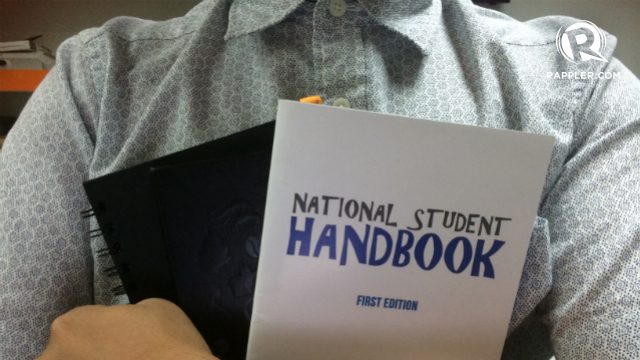SUMMARY
This is AI generated summarization, which may have errors. For context, always refer to the full article.

MANILA, Philippines – The National Anti-Poverty Commission (NAPC) recently launched the first edition of the National Student Handbook – a set of guidelines on the rights and welfare of Filipino high school and college students.
The handbook is a compilation of government regulations and existing laws on issues most relevant to students, such as tuition fee hikes, student discipline, hazing and other school-related violence, and basic freedoms of religion and free expression.
It also features the Students’ Rights and Welfare (STRAW) bill filed by Akbayan partylist Representatives Ibarra “Barry” Gutierrez III and Walden Bello in May.
The handbook enumerated 5 reasons why the STRAW bill must be passed:
- The STRAW bill will ensure that no one will be discriminated based on physical handicaps, socioeconomic status, political or religious beliefs, sexual orientation, HIV status, pregnant women, or membership in certain organizations.
- The perennial problem of sudden increase of tuition and other fees will be resolved by institutionalizing the consultative mechanisms of students. This will secure the accessibility of education among students.
- The passage of the STRAW bill will ensure student representation through student councils. It secures the rights of students to organize their own organizations or to assemble.
- The bill will also empower students through representation in policy-making bodies, and to express their concerns as students and stakeholders of the institutions.
- With the enactment of the law, freedom of expression will be the cornerstone of healthy academic discussion. School publications will not be influenced by the school administration, thus promoting balanced and unbiased journalism.
“Students’ rights and welfare are human rights, and thus must be uniformly recognized, protected and promoted,” Gutierrez and Bello wrote in the STRAW bill’s explanatory note.
| The STRAW bill is for… | The STRAW bill is against… |
|
Rights against discrimination in educational institutions |
Discrimination on the basis of sex, gender, socio-economic status, political and religious beliefs, ethnicity, or disability |
| Rights to competent instruction and relevant quality education | Denial of access to adequate welfare services and academic facilities |
| Rights to academic procedure and academic freedom | Illegal searches and seizures |
| Rights to organize and right to establish a student council | Militarization of the school campus |
| Right to representation and participation in policy-making bodies and processes | Tuition and/or school fee increase without consultation |
| Right to information | |
| Right to freedom of expression and to publish a school newspaper | |
| Right to due process | |
| Right to privacy | Data from the National Student Handbook (First Edition) |
The National Youth Commission (NYC), a government agency that formulates policies, programs and measures for the youth, also helped in crafting the handbook.
The organization noted that not all of the country’s 1,923 higher education institutions have a functioning student government that can represent the needs of students to their respective school administration.
“This leaves our students highly vulnerable to possible abuses of their rights brought about by policies form school administrators,” NYC chairperson Gio Tingson said in a statement.
Maverick Banzon — chairperson of Student Council Alliance of the Philippines (SCAP) in the National Capital Region – said the handbook is only “the prelude to a more permanent and formidable safeguard” that an actual legislation on students’ rights and welfare can provide.
For now, NAPC is requesting government agencies (Department of Education, Commission on Higher Education, Technical Education and Skills Development Authority, Commision on Human Rights) to post an e-book of the handbook on their websites.
The commission is also looking for partners who can cover the handbook’s publication and distribution in schools. – Rappler.com
Add a comment
How does this make you feel?
There are no comments yet. Add your comment to start the conversation.